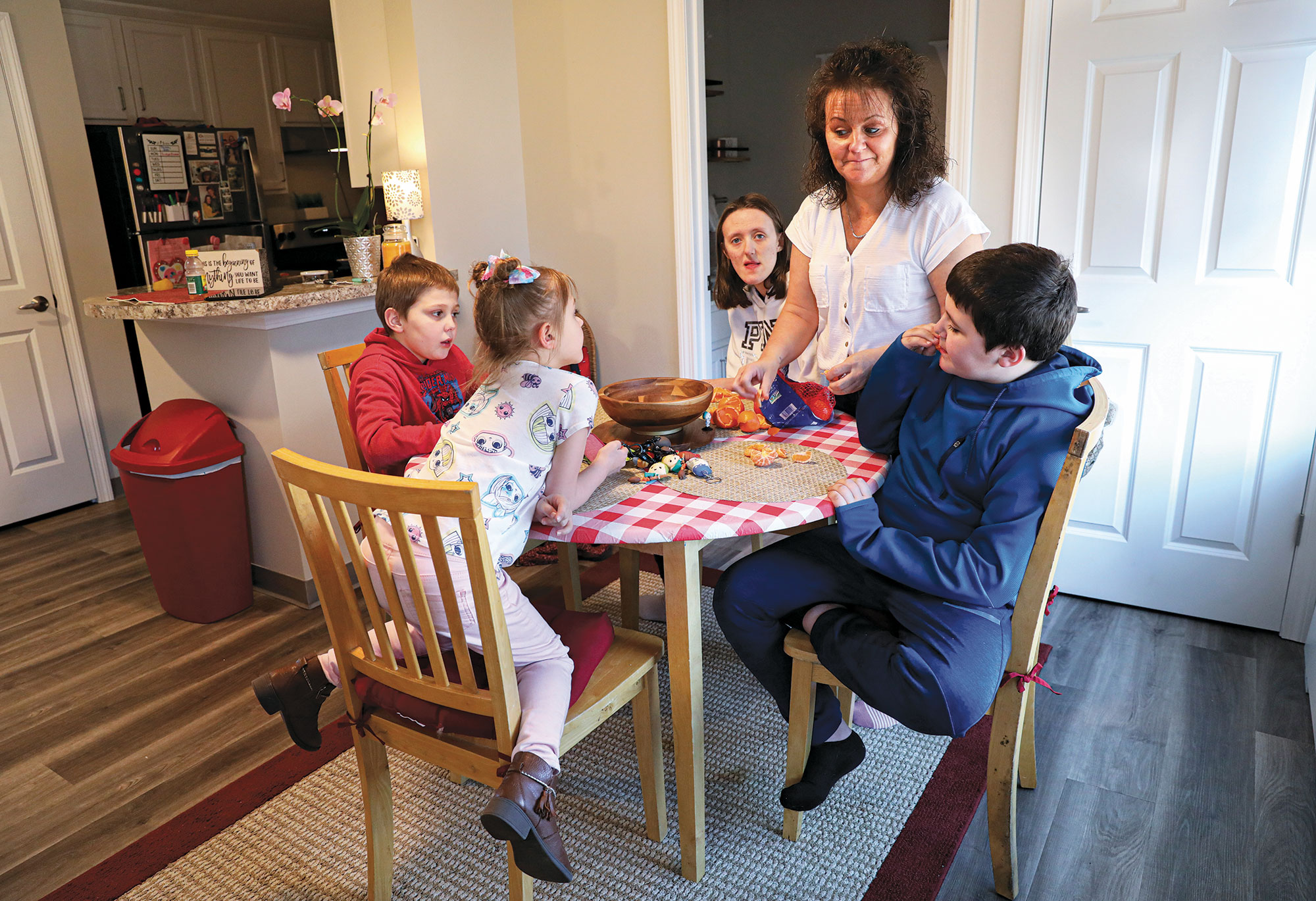Sharon counts her family among the fortunate ones.
For five months, she shepherded her family from place to place. Sharon, her 22-year-old daughter with disabilities and her three grandchildren under 10, spent Christmas in a motel. They had a little blue tree that came from a client whose office Sharon cleans.
They slept on floors and couches. Sharon thought about a shelter, but was unsure the family would be safe from Covid in a congregate setting.
They all got Covid anyway.
Sharon, who runs her own cleaning business, tried desperately to find housing. Apartment showings were crowded. Rents were approaching $3,000 a month for three-bedroom units.
The family had been going from hotels to friends’ houses. Sharon got a call from a client on a day when she could not take the job because she had to find new place to stay before the end of the school day.
“I didn’t want to ask for help,” Sharon said. “It’s embarrassing to say ‘I am homeless and I can’t provide a place for my kids to stay.’”
When she did explain why she could not work that day, her client clicked into high gear. She helped find a motel room, created a “Gofundme” page to help the family — and connected Sharon with CATCH, a nonprofit developer of affordable housing. On the same day Sharon was interviewed for one of CATCH’s three-bedroom units, someone else took their own name off the waiting list and Sharon found herself, miraculously, at the top. She still had to wait (construction was not complete) but now her family is in a townhouse with affordable rent and a backyard. Sharon keeps reaching for the word “heaven” to describe it.
When she wakes up in the morning knowing the family is safe and does not have to leave, gratitude washes over her.
New Hampshire’s housing crisis is not new. But it is severe.
More than 4,600 people — including 1,254 in families — experienced homelessness in New Hampshire in 2021. People — including some working full-time — are living in cars, shelters, tents, on other people’s living room floors.
The state’s rental vacancy as of July 2021 was less than 1 percent for market-rate units. In some areas the rate is as low as 0.6 percent.
Rents have been climbing steadily. A wage earner in New Hampshire must make almost $25 an hour to afford an average two-bedroom apartment.
The pandemic exacerbated the crisis — creating more demand that drove prices up and resulted in bidding wars for houses and fierce competition for apartments.
“You just have such restrictive supply and such high demand,” said Elissa Margolin, executive director of Housing Action NH. “If you are a person of moderate, low or extremely low income it is almost impossible to find housing.” The crisis has ripple effects. Housing instability and homelessness have lasting adverse effects on the mental health, physical health and economic mobility of families and children.
Housing segregation by class — endemic, particularly in New Hampshire’s most populous cities — presents a chilling barrier to success for children who grow up surrounded by poverty. The barriers are even higher for many Black and Latino children.
The housing crisis has economic fallout, with New Hampshire businesses unable to hire people for lack of housing options, or unable to find housing for new hires.
The housing crisis is enormously complex and defies any single solution. New Hampshire nonprofits have been working on multiple fronts to address the crisis, and the Foundation has been proud to support their efforts. Here are some of the ways in which nonprofits are working to address this crisis:
Building, refurbishing and financing affordable housing
CATCH Neighborhood Housing, the organization that built Sharon’s home, was founded in response to the state’s housing crisis. In 1989.
It that time, it has created almost 400 affordable housing units and, through the HOMEteam program created in partnership with Neighborworks Southern NH, provides workshops, counseling and other resources for first-time home buyers, for renters to save for home ownership, and for home owners to protect their investments in their homes.
Similar organizations around the state — from Nashua to the North Country — have been working diligently for decades.
Nonprofits also finance affordable housing. The NH Community Loan Fund provides access to credit, along with education, to help people with low incomes purchase manufactured homes, and flexible financing to developers of affordable housing. The Community Loan Fund’s ROC-NH (resident-owned communities) program, which helps homeowners in manufactured housing parks purchase and manage their parks as cooperatives, has become a national model for creating sustainable communities of affordable housing. There are now 142 ROCs around the state, containing more than 8,500 affordable homes.
Innovations continue to spring up: Nonprofits are working in local coalitions, and directly with landlords, businesses and developers, to increase availability of affordable housing.
But it’s an uphill battle: To meet current demand and stabilize the housing market, New Hampshire needs an estimated 20,000 additional housing units.
First and foremost, restrictive zoning and excessive regulation at the local level is what has prevented the market from meeting demand in recent decades. The number one way most of us can make a difference is by getting involved at the local level.
–Rob Dapice, executive director of NH HousingTweet This
Advocating for policies and public investments
Advocacy at the state level has led to some important progress in recent years.
Advocacy spurred the creation of the New Hampshire Council on Housing Stability, which adopted the state’s first comprehensive plan to promote housing stability and address homelessness.
Margolin points to increased and dedicated funding for the state’s affordable housing fund and for homeless center services; the creation of a Medicaid benefit for supportive housing services; the establishment of a housing appeals board, protection of the state’s workforce housing law and passage of an accessory dwelling unit law; and the securing of critical federal funding for rental assistance and homeless services.
Governor Chris Sununu recently announced that $100 million in federal funding will be allocated to ease the state’s housing crisis by providing incentives to municipalities and builders to build more housing.
Housing Action New Hampshire NH and others are advocating for a raft of pending state legislation to expand affordable housing.
Regional nonprofit coalitions are leading efforts to make local ordinances and regulations more welcoming to affordable housing. “First and foremost, restrictive zoning and excessive regulation at the local level is what has prevented the market from meeting demand in recent decades,” said Rob Dapice,executive director of NH Housing. “The number one way most of us can make a difference is by getting involved at the local level. We need to recognize that people need diverse housing choices in the communities where they live and want to live.”
In the Mount Washington Valley — which depends on the outdoor recreation and tourism industries — the people who make those industries run have too frequently found themselves living in cars and tents for lack of affordable housing options.
The Mount Washington Valley Housing Coalition led an effort in Conway for a warrant article that passed by a wide margin and unlocked the possibility for a new housing development. It’s working on additional measures.
“We’re not saying to throw regulations out the window,” said Coalition Executive Director Harrison Kanzler. “What is important is to know what you don’t want and know what you need, and be able to be proactive with your zoning to differentiate those things.”
Protecting people facing eviction
Housing represents the largest practice area of NH Legal Assistance, a nonprofit law firm that provides people with low incomes with legal advice, representation and advocacy in noncriminal cases.
“We are focused on keeping people in their housing, because our client community is at risk of chronic homelessness if they get evicted in this housing market,” said Legal Assistance Executive Director Sarah Mattson Dustin.
Legal Assistance recently partnered with New Hampshire courts and Southern NH Services to help connect people facing eviction with federal emergency rental assistance made available through Covid relief legislation. Efforts by local nonprofits helped spread the word and help people to apply for that assistance and for other resources.
Mattson Dustin said that emergency federal assistance made an “enormous, enormous” difference.
Still, the crisis is deepening for some of the state’s most vulnerable residents. People who qualify for subsidized housing through the federal Housing Choice Voucher Program (or “Section 8”) are far less likely to be able to find housing here than they were less than a decade ago.
To alleviate the current housing crisis for people with limited incomes, Mattson Dustin said, the state needs more subsidized housing, more landlords who will accept housing vouchers — and zoning changes to promote more housing options.
Dapice said that he expects the federal emergency rental assistance money, which has helped many people stay housed, to be expended by the end of 2022.
Providing direct services to the unhoused
When the pandemic hit, New Hampshire’s homeless shelters adapted in ways large and small. Hundred Nights in Keene houses people in its shelter building — plus a converted bus and hotel rooms.
“There has been a huge increase this year” in people needing the shelter, said Hundred Nights Executive Director Mindy Cambiar. “People have been getting evicted left and right because landlords are selling buildings because real estate prices are so high.”
The organization is now creating a standalone, 48-bed shelter. It is expected to be full the day it opens. Hundred Nights is one of more than two dozen organizations statewide that provide shelter and other services for people experiencing homelessness.
Providing transitional supportive housing
Nonprofit organizations around New Hampshire provide people with a bevy of supports to help them move to permanent housing.
At Family Promise of Southern NH in Nashua, those services include congregate housing, classes, counseling, connection to community resources, and a savings program so people can build credit and afford a home or apartment.
“It’s the average working families with low to middle income that fall through the cracks,” said Pamela Wellman, Executive Director of Family Promise of Southern New Hampshire. “These are hard-working families. They make average salaries, but it’s not enough to support a family.”
The effects can be devastating.
“We have seen an increase in mental health issues,” she said. “If somebody is sleeping in their car and they have lost their job and their home — of course they are going to have mental health issues. Families are under a ton of stress.”
The housing crisis affects everyone: young families, people trying to downsize, people running businesses, hospitals and other critical service providers — and everyone who needs goods and services.
Sharon said that while she was searching desperately for a home, she met many other families “struggling just as much as I was.” Sometimes, they would show up at the same apartment tours, in competition for space. She wishes she could find homes for them all.
“Something definitely has to change,” she said. Her grandchildren, she marvels, are “the strongest people I know. I am glad this didn’t break us, because it definitely almost did.”













![Oluwakemi Olokunboyo of Dover received a McNabb scholarship to study nursing at Great Bay Community College [Photo by Cheryl Senter]](https://www.nhcf.org/wp-content/uploads/2024/05/Scholarship-Hero-800x548.jpg)

![Rev. Heidi Carrington Heath joined Seacoast Outright. [Photo by Cheryl Senter]](https://www.nhcf.org/wp-content/uploads/2024/05/Heidi-Carrington-Thumbnail-800x548.jpg)
![Dr. Jennie Hennigar treats a patient at the Tamworth Dental Center [Photo by Cheryl Senter]](https://www.nhcf.org/wp-content/uploads/2024/05/TCCAP-Hero-800x548.jpg)

